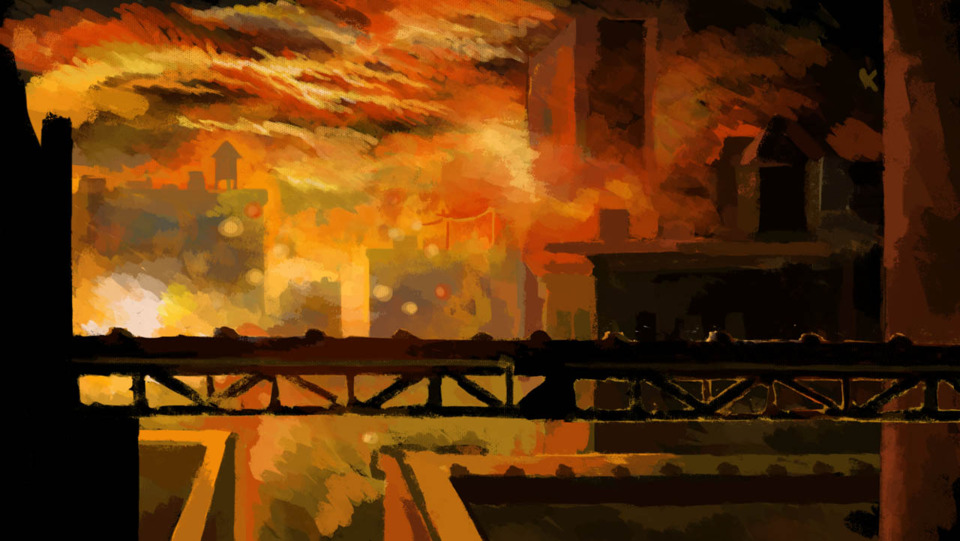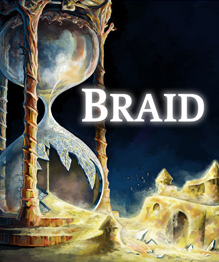A beautiful, unforgettable puzzle/platformer experience

Believe me, dear reader, it took a lot to resist the urge to make some sort of pun involving time in the title of this review...”Braid is Timeless”, “Braid rewinds puzzle/platforming to a simpler age”, etc. etc. But I didn't go that route out of respect for you. I hope you appreciate that!
Anyhow, Braid is a puzzle/platformer whose gimmick is that of time travel. Tim, the main character, is off searching for his princess, and like every other puzzle/platformer out there, Tim has to traverse multiple words by solving puzzles and jumping on platforms. Of course, as I mentioned, Tim is able to travel in time, and he's able to revers and fast forward at will. This sets Braid apart from other games like it almost instantly and it gave the developers freedom to implement a lot of cool ideas.
In a lot of ways, it's as if the developers sat down and said, "Alright, make a list of what sucks about puzzle games. Now let's make sure none of those things make it into our game". For instance, you have no lives or health to worry about, nor can you get a " game over" at all due to Tim's ability to rewind time. Enemies are few, and they don't just serve as an annoyance - they are CRUCIAL to solving certain puzzles. Everything is tightly focused on the puzzle solving and the platforming, which is of course exactly what you'd want in such a game. In all, these things help Braid feel more like an experience than a game.
It's clear they subscribed heavily to the "less is more" approach right from the start. By the first world you've probably seen all the different elements that you'll see in the entire game; you'll be seeing a lot of keys, locked doors, and Goomba-like enemies in just about every level. Instead of introducing new elements in every level, Braid decides to rearrange those elements in new and interesting ways, integrating them into the ever changing time powers Tim is granted. It's game design based around the tried and true method of "easy to learn, hard to master". You'll learn very quickly what the game expects of you and the tools you have at you disposal, and from there you can concentrate on the specific puzzles and time elements...and when it comes to wrapping your mind around time travel, you'll want all the concentration you can muster.
Levels themselves are brilliantly done, and each world has a certain theme with a new time power unique to the levels inside. Each level has a certain number of puzzle pieces in it, with some being easier to get than others, and these puzzle pieces serve as the main goal to advancing your progress. The game doesn't require you to get all the puzzle pieces - indeed, you'll find you can skip almost every level without getting a single piece. This makes Braid accessible and addicting, allowing hardcore players to keep grinding away at the challenge while letting more casual players continue unabated.
However, if you do decide to pursue those puzzle pieces, keep in mind Braid is hard. The game rewards clever use of time manipulation as opposed to skillful jumping, but unfortunately some of time this means you continuously fail at a level without really feeling like you could do anything different. It can be awfully frustrating trying to figure out what the game wants you to do, and the ability to rewind time after every death or failure makes it a bit too easy to simply try the same thing you did before without really thinking it through. Thankfully, taking a break and returning to the game is usually enough for that "ah-ha!" moment to hit.
All of this is wrapped up in a beautiful package in one of the most memorable art directions I've seen in an independent game. All the art assets are hand drawn and they look like water color paintings come to life. There is never a clear theme in the worlds – Tim is clearly from modern times with his suit and tie, but he's in a very fantasy inspired world. This juxtaposition can also been seen in the art and music of the game, and the combination of modern and fantasy elements makes for a very intriguing mix.
Speaking of art, in between levels are different passages you can read that suggest what the next world's time manipulation gimmick will be, but also hint at a much larger story. Personally I believe the alternate theories of Braid's story are rubbish, and much prefer the abstract and slightly confusing tale of a man chasing his princess. The end of the game will blow your mind, and cause an extreme emotional response.
Braid is a short, simple, and highly focused piece of work. In this way, it captures a lot of the elements you might find in an older puzzle/platformer will combining it with new innovations you'd expect in a current-gen title. Borrowing elements from games new and old is very fitting for a game that focuses on time travel. There is no reason not to play Braid, and the experience you get from playing it is simply unforgettable.
